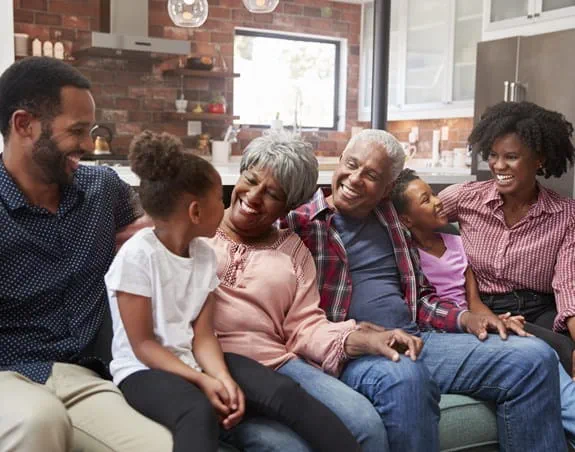Check your family history
Learn what you can about your family history of cancer
In some families, certain abnormal genes that cause cancer can be passed down from parent to child. These abnormal genes may lead to people in that family having cancer. But this is not as common as you might think. There are also other reasons why cancer may happen in many members of a family, including sharing a common environment or lifestyle.

Learn what you can about your family history of cancer. Talk to your healthcare provider about it. Make sure to tell them if your parents, children or siblings have ever had cancer. They will want to know what type of cancer these close relatives had and how old they were when they were diagnosed.
Your healthcare provider can help you understand your cancer risk and talk to you about possible next steps, such as genetic testing.
All about genes
We all inherit a set of genes from each parent. These genes are responsible for traits such as how tall you are, the shape of your body and the colour of your hair, eyes and skin. People from the same family often share these and other types of characteristics.
Our bodies are made up of cells. In each and every cell, genes guide how the cell develops and functions. Every gene has a specific role. Genes are like an instruction manual for our bodies, determining what we look like and how our bodies grow and function.
A gene mutation happens when there is a change or mistake in a gene.
Gene mutations can happen in 2 ways:
- They can be inherited from a parent.
- They can be the result of changes that happen during a person's lifetime.
A gene mutation can be harmful, harmless or even helpful.
For most mutations, a cell can usually repair any damage before it becomes a problem. But if it can't repair the damage, certain mutations can lead to a cell becoming a cancer cell. Cancer cells grow and divide in an uncontrolled way.
Inheriting a harmful gene mutation may increase your risk for cancer. It does not mean you will definitely develop cancer.
Genes and cancer risk in families
When there is cancer in your family, it’s normal to worry that you will develop cancer as well. But even if 1 or 2 family members have been diagnosed with cancer, it doesn’t mean that you will be diagnosed – especially if the family member is not a first-degree relative (your parent, child or sibling) or if different family members have had different types of cancer.
How do I know if the cancer in my family is hereditary?
Only about 5% to 10% of all cancer cases are hereditary, meaning they are caused by an inherited gene mutation.
A cancer might be considered hereditary if:
- family members in more than one generation have had the same type of cancer
- family members developed cancer when they were younger than 50 or younger than usual for that type of cancer
- a family member has had more than one type of cancer
There are genetic tests available to test for gene mutations for some types of cancer. Genetic testing should always be done at a clinic that also provides counselling and education. Some people may decide not to have genetic testing because they prefer to not know if they are at increased risk of cancer or other inherited diseases.
What can I do if I have increased risk of developing cancer because of my family history?
Depending on how high your risk is, cancer specialists may recommend ways to help prevent cancer or find it early.
Your options may include:
- changing your lifestyle
- having genetic testing
- having regular checkups
- screening at an earlier age or having screening tests more often than usual
- having preventive surgery
- taking drugs that may help lower your risk

Do I need to tell my kids?
It’s important for your children to know about their family health history. If you or other family members have had genetic testing that found a gene mutation, your children may also choose to get tested at the appropriate time.
You may also wish to tell other family members that you are being tested and talk to them before you get the results of your test. Some family members may want to know if you have a genetic change linked to cancer so they can decide if they should also get tested. But others may not want to know your test results or find out their own risk.
Which cancers are hereditary?
Scientists have discovered inherited gene mutations for certain types of cancer, including:
Some gene mutations increase the risk of developing more than one type of cancer. For example, a gene mutation that increases the risk of developing breast cancer may also increase the risk of ovarian cancer.
Inherited gene mutations are often linked to a family cancer syndrome. Most are rare. Not everyone with a family cancer syndrome develops cancer.
Research is continuing to tell us more about specific genes that may put people at higher risk of developing cancer.
Your trusted source for accurate cancer information
With support from readers like you, we can continue to provide the highest quality cancer information for over 100 types of cancer.
We’re here to ensure easy access to accurate cancer information for you and the millions of people who visit this website every year. But we can’t do it alone.
Every donation helps fund reliable cancer information, compassionate support services and the most promising research. Please give today because every contribution counts. Thank you.
